Charles E W Bean, Diaries, AWM38 3DRL 606/261/1 - 1929 - 1930 - Part 15
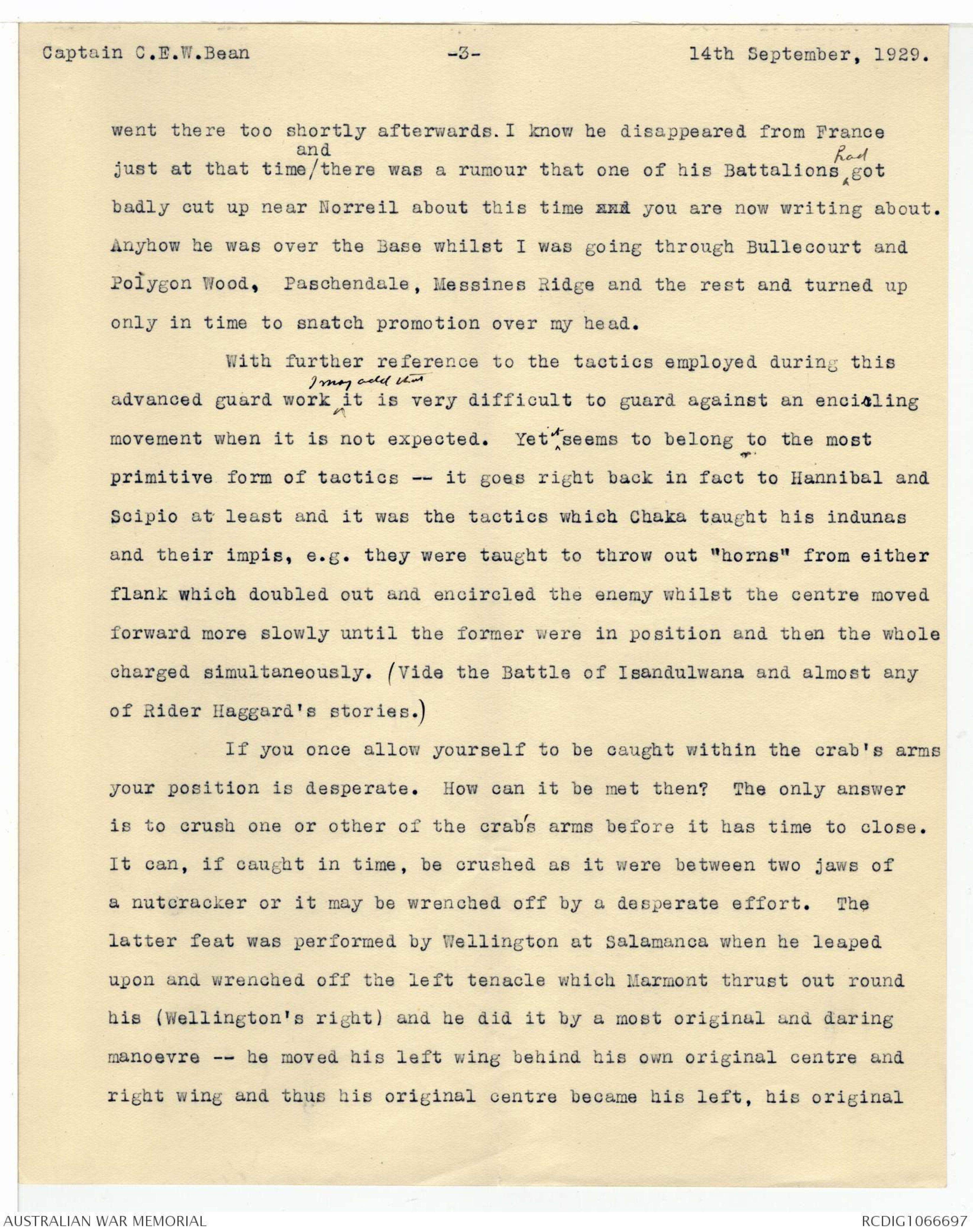
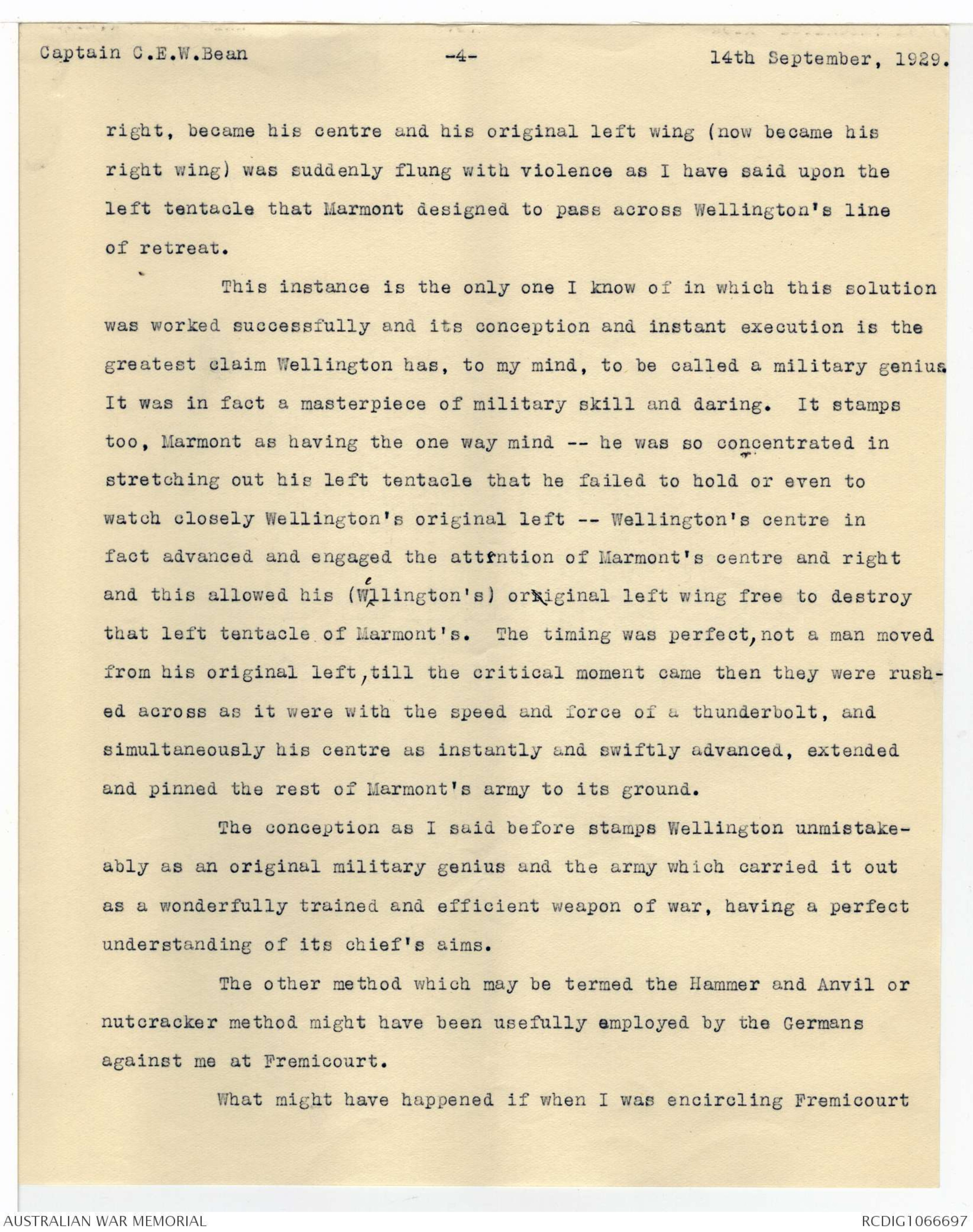
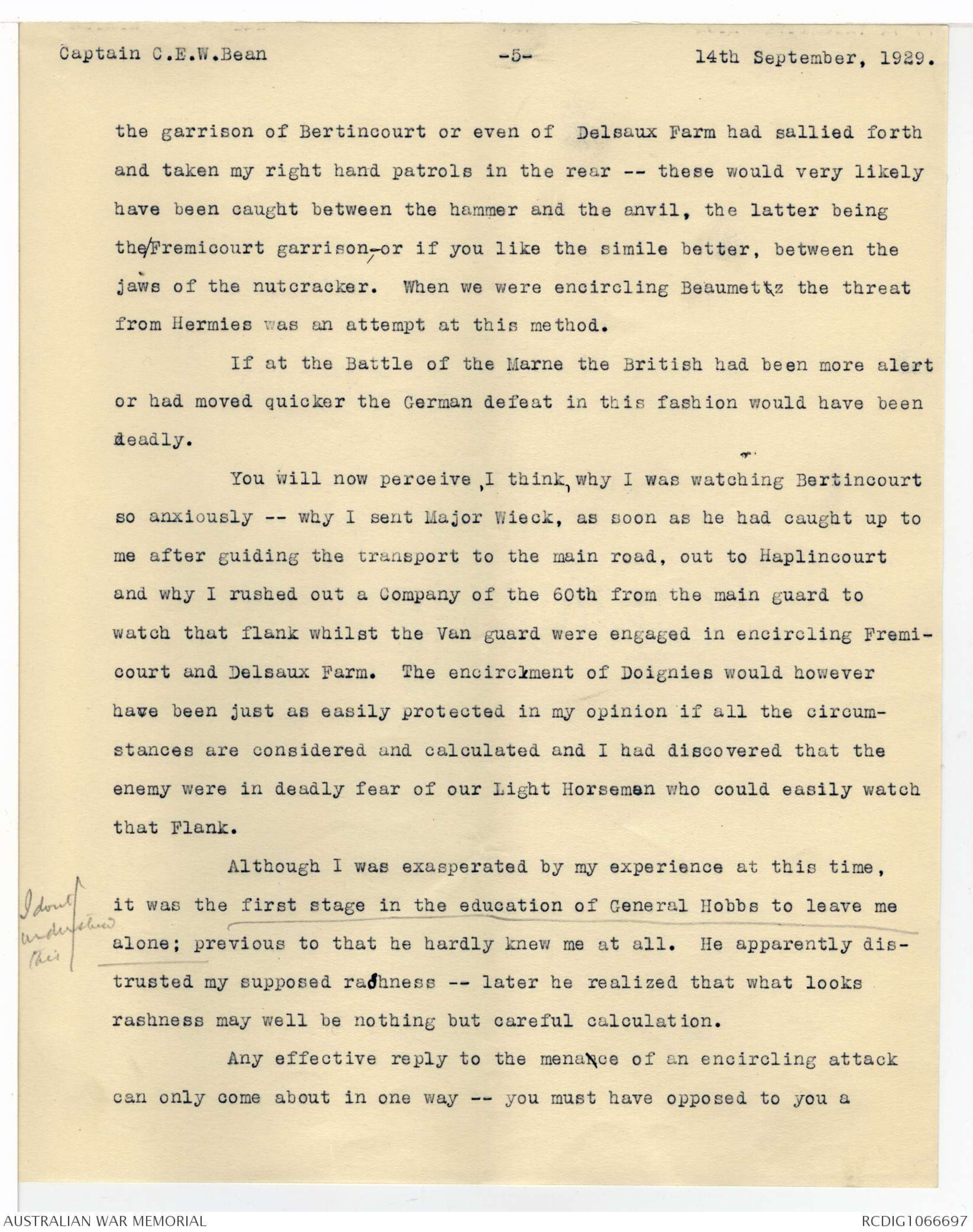
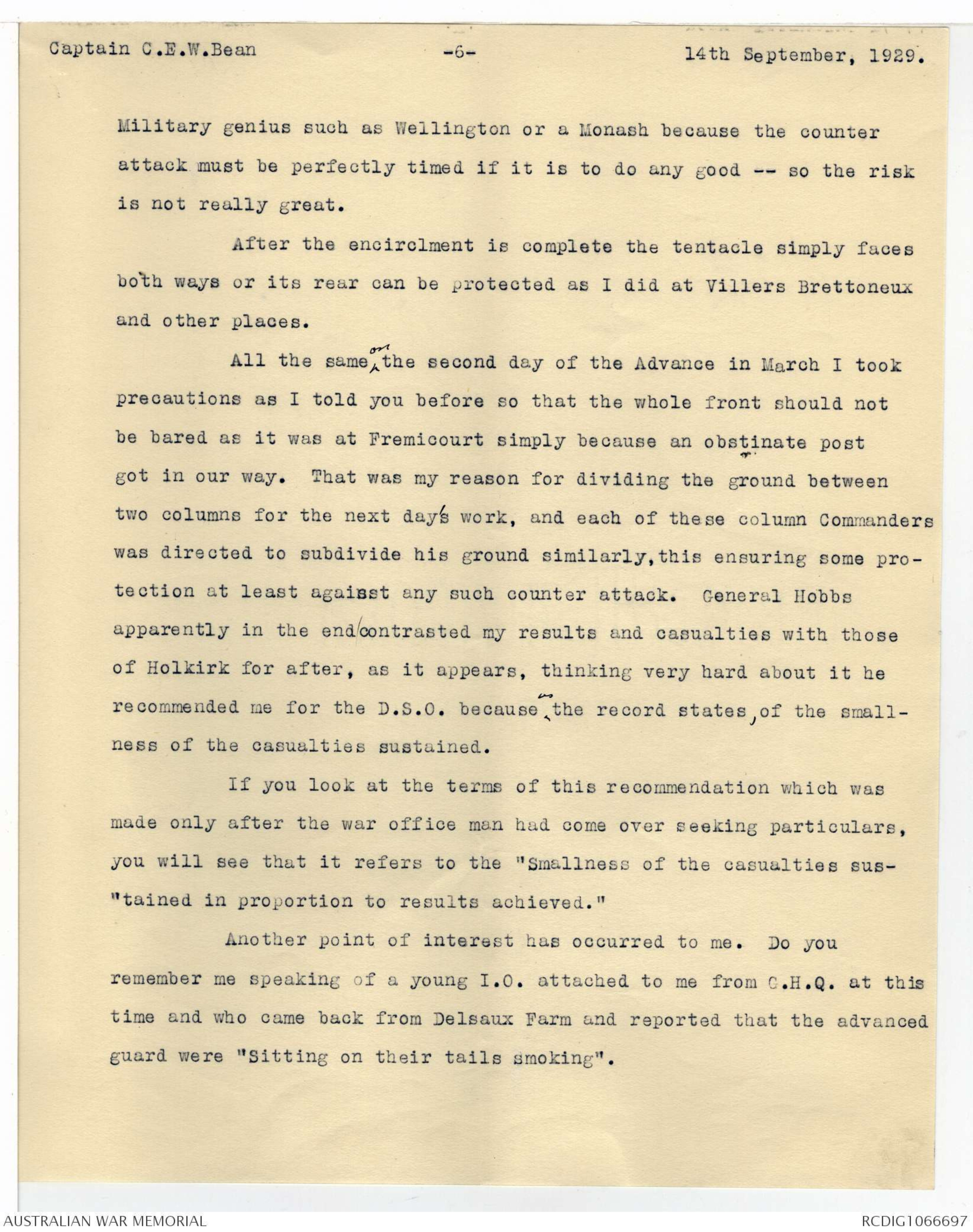
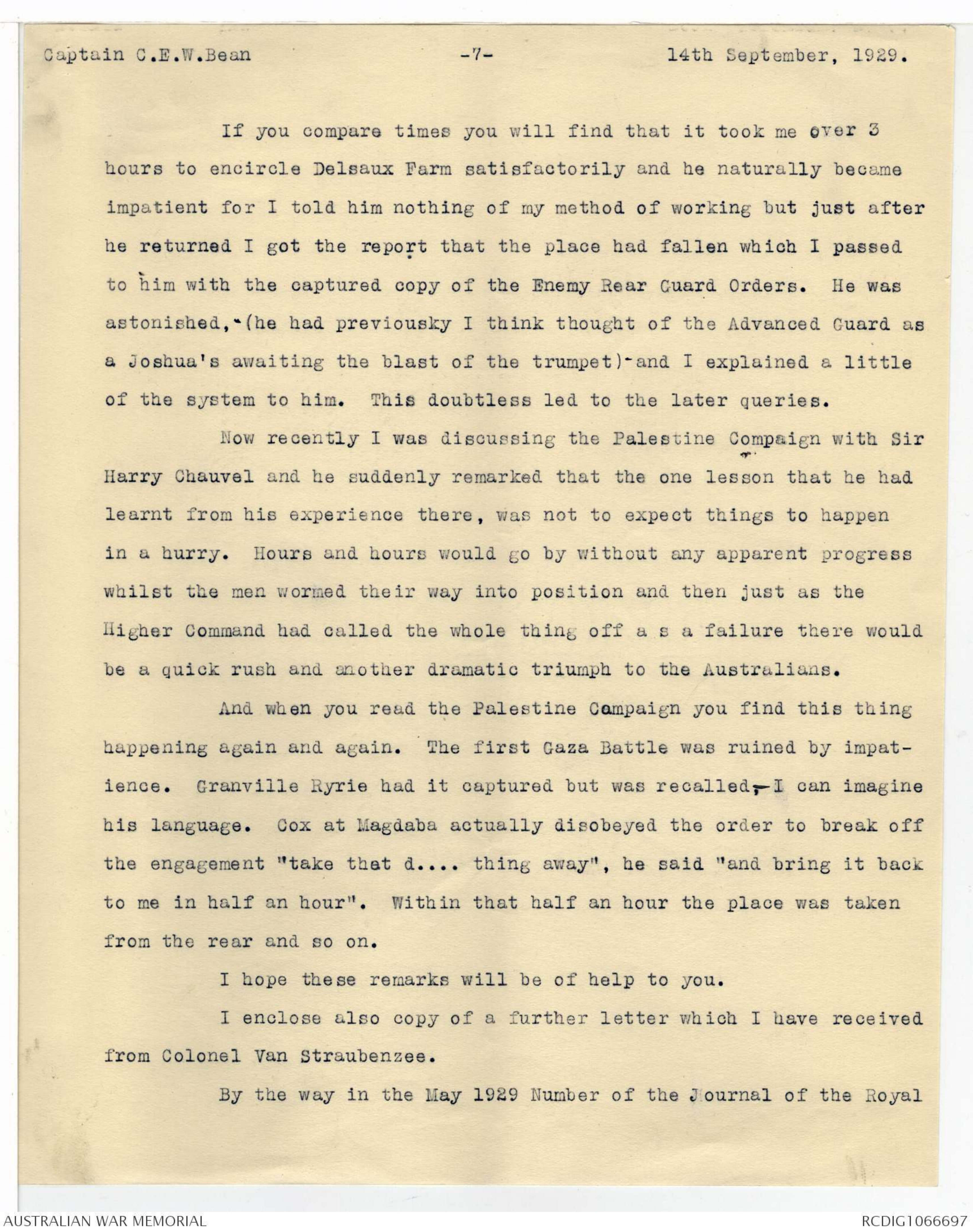
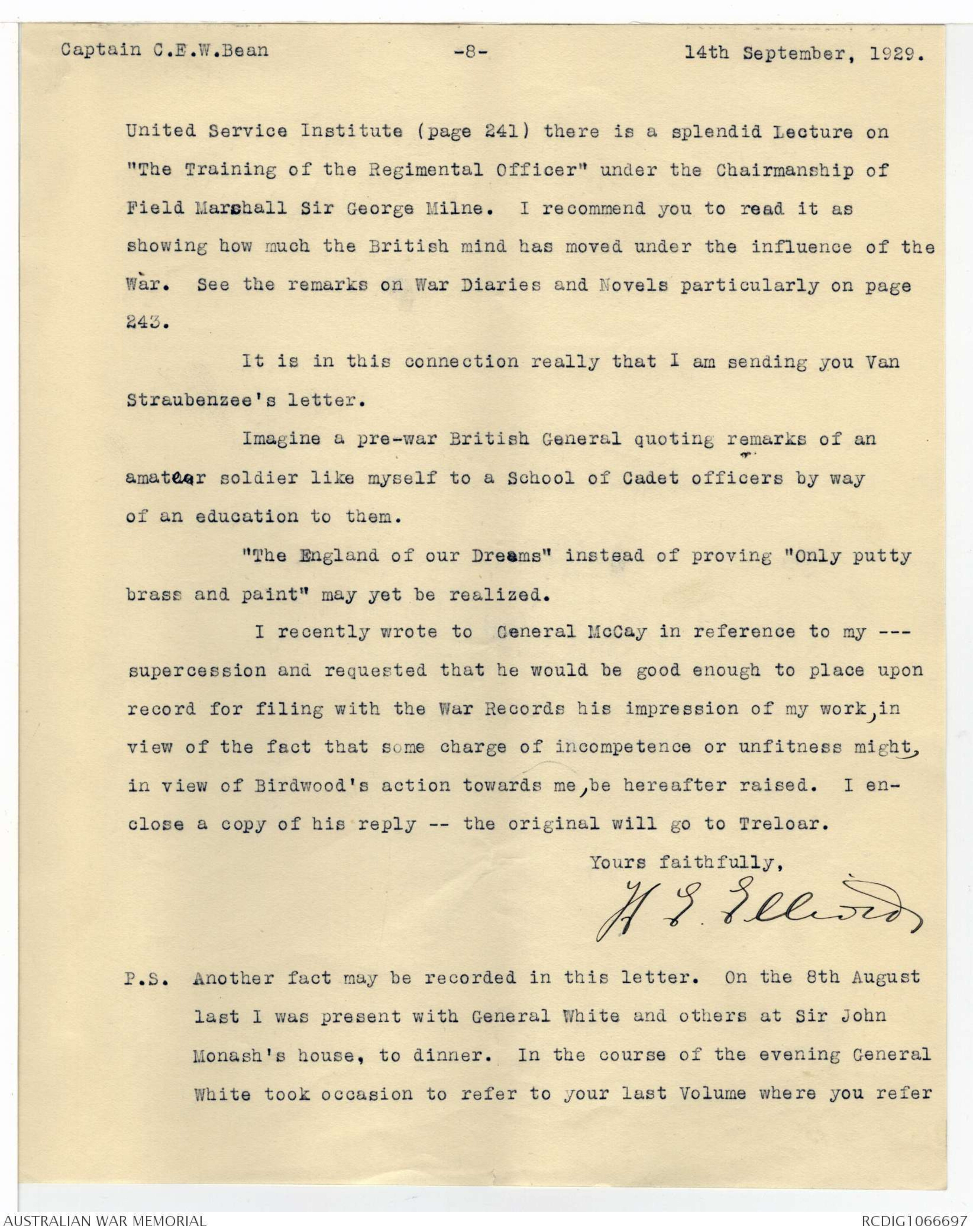
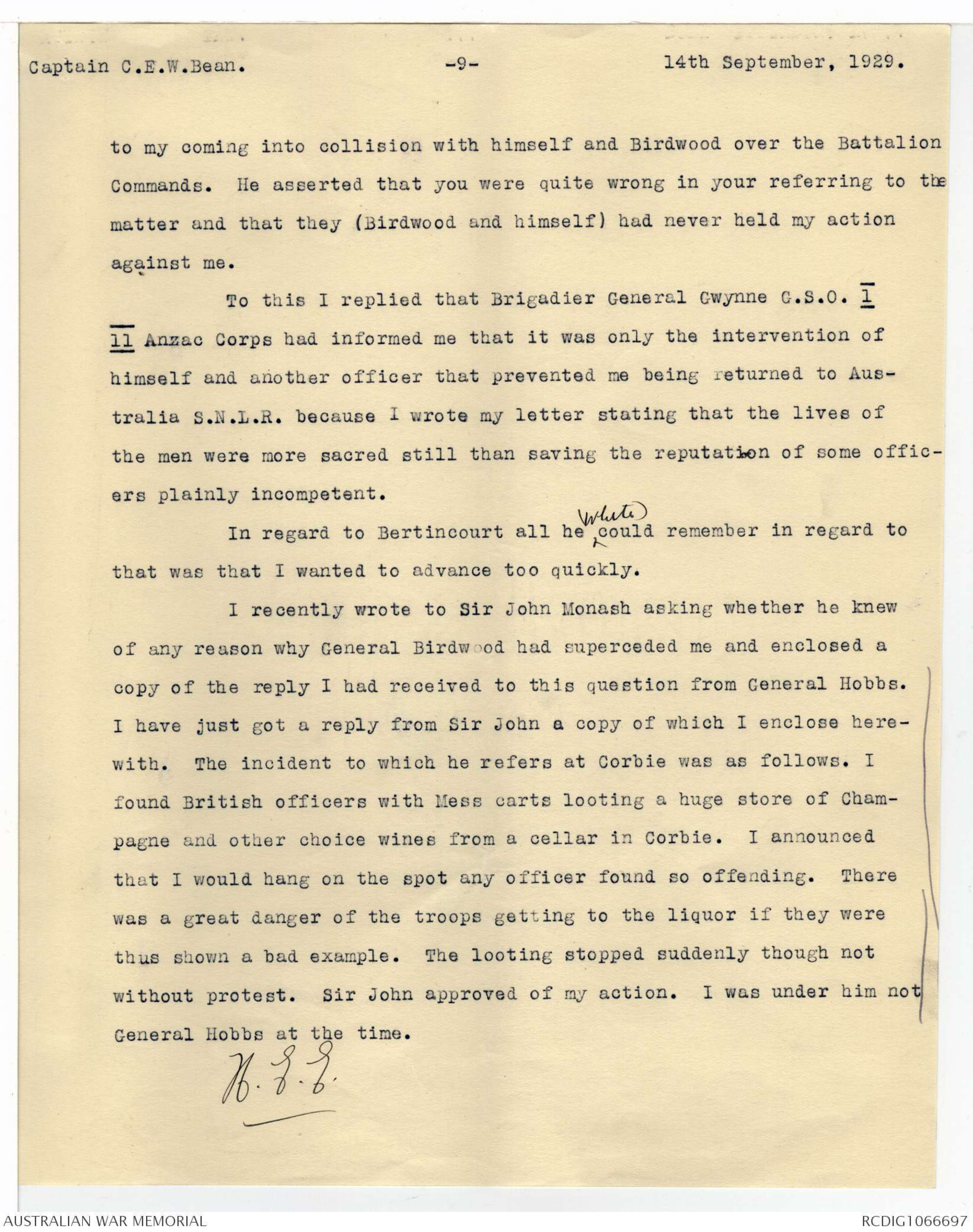
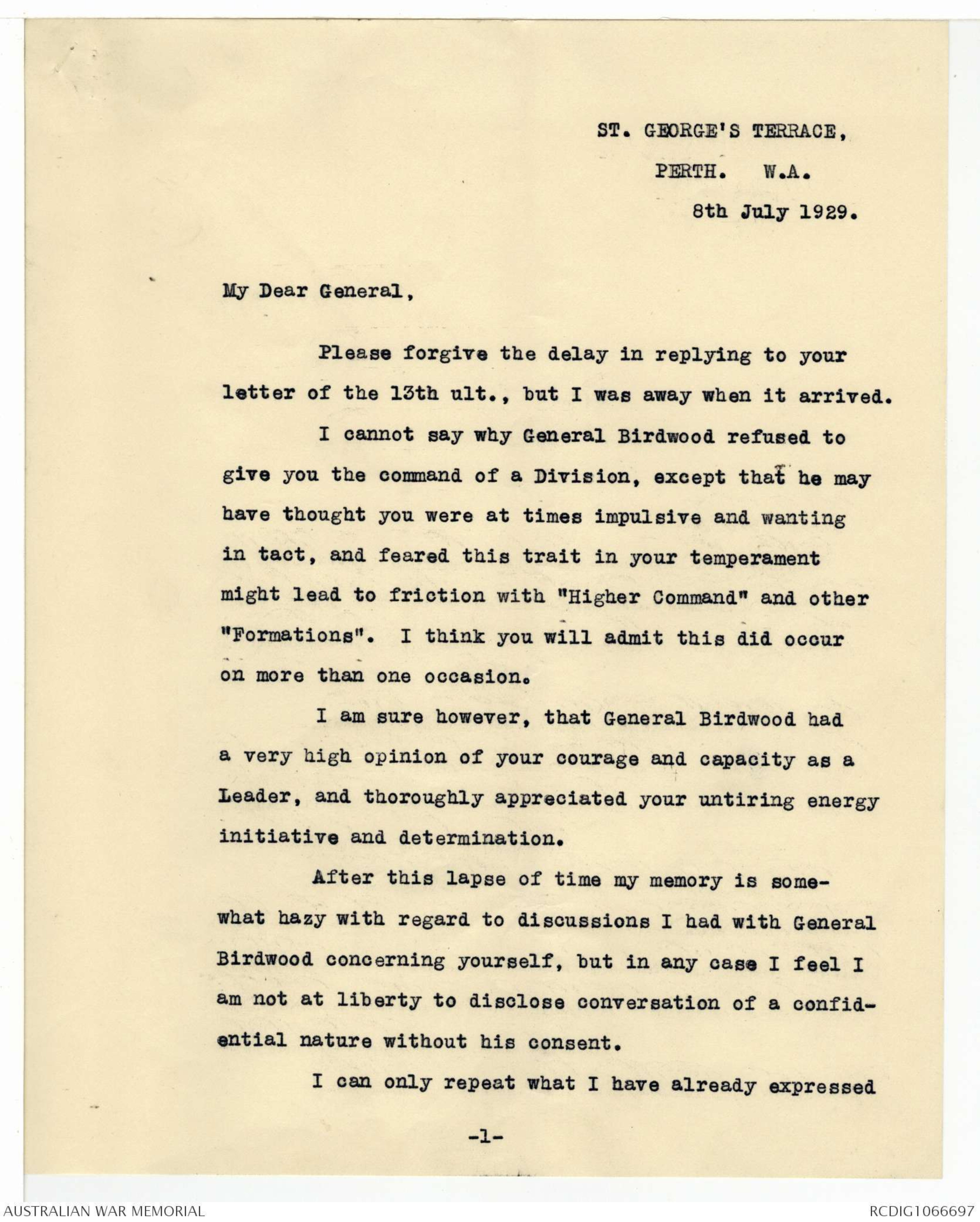
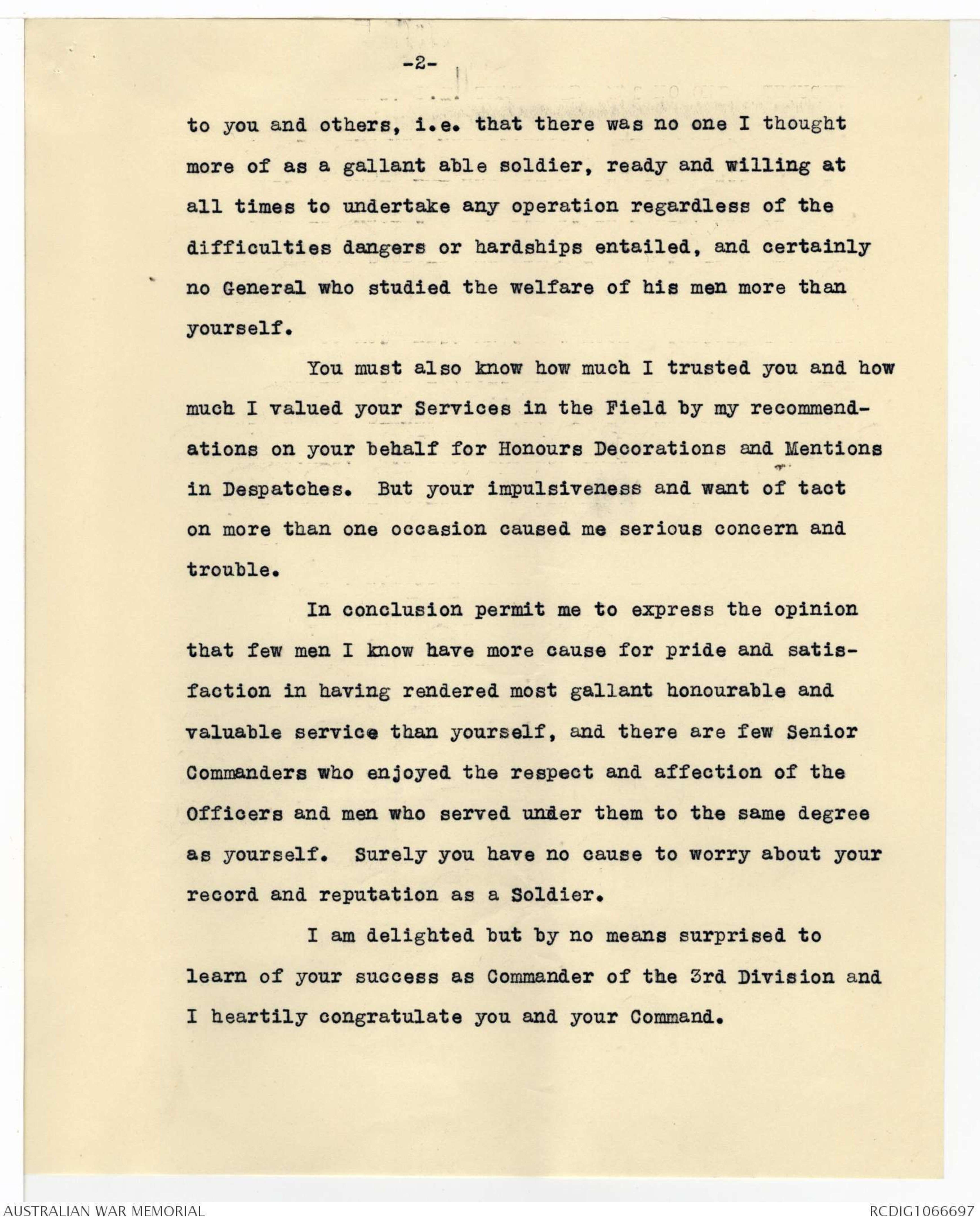
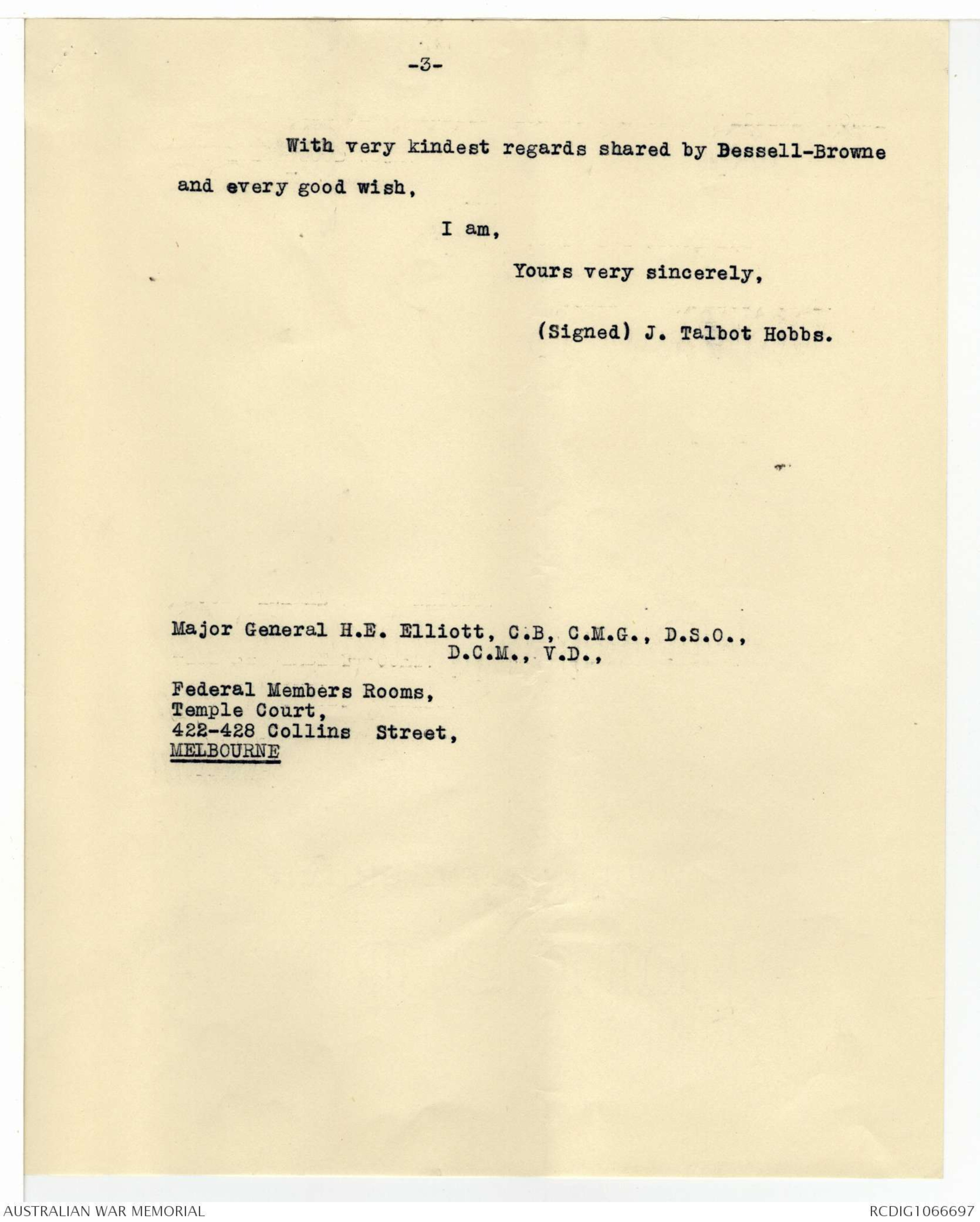
Captain C.E.W. Bean -3- 14th September, 1929.
went there too shortly afterwards. I know he disappeared from France
just at that time /and there was a rumour that one of his Battalions ^had got badly cut up near Norreil about this time and you are now writing about. Anyhow he was over the Base whilst I was going through Bullecourt and Polygon Wood, Paschendale, Messines Ridge and the rest and turned up only time to snatch promotion over my head.
With further reference to the tactics employed during this
advanced guard work ^ I may add that it is very difficult to guard against an encicling movement when it is not expected. Yet ^it seems to belong to the most primitive form of tactics -- it goes right back in fact to Hannibal and Scipio at least and it was the tactics which Chaka taught his indunas and their impis, e.g. they were taught to throw out "horns" from either flank which doubled out and encircled the enemy whilst the centre moved forward more slowly until the former were in position and then the whole charged simultaneously. (Vide the Battle of Isandulwana and almost any of Rider Haggard's stories).
If you once allow yourself to be caught within the crab's arms
your position is desperate. How can it be met then? The only answer
is to crush one or other of the crab's arms before it has time to close.
It can, if caught in time, be crushed as it were between two jaws of
a nutcracker or it may be wrenched off by a desperate effort. The
latter feat was performed by Wellington at Salamanca when he leaped
upon and wrenched off the left tenacle which Marmont thrust out round his (Wellington's right) and he did it by a most original and daring manoevre --he moved his left wing behind his own original centre and right wing and thus his original centre became his left, his original
Captain C.E.W.Bean -4- 14th September, 1929.
right, became his centre and his original left wing (now became his
right wing) was suddenly flung with violence as I have said upon the
left tentacle that Marmont designed to pass across Wellington's line
of retreat.
This instance is the only one I know of in which this solution
was worked successfully and its conception and instant execution is the
greatest claim Wellington has, to my mind, to be called a military genius. It was in fact a masterpiece of military skill and daring. It stamps
too, Marmont as having the one way mind -- he was so concentrated in
strething out his left tentacle that he failed to hold or even to
watch closely Wellington's original left -- Wellington's centre in
fact advanced and engaged the attention of Marmont's centre and right and this allowed his (W^ellington's) orriginal left wing free to destroy that left tentacle of Marmont's. The timing was perfect, not a man moved from his original left, till the critical moment came then they were rushed across as it were with the speed and force of a thunderbolt, and simultaneously his centre as instantly and swiftly advanced, extended and pinned the rest of Marmont's army to its ground.
The conception as I said before stamps Wellington unmistakeably
as an original military genius and the army which carried it out
as a wonderfully trained and efficient weapon of war, having a perfect
understanding of its chief's aims.
The other method which may be termed the Hammer and Anvil or
nutcracker method might have been usefully employed by the Germans against me at Fremicourt.
What might have happened if when I was encircling Fremicourt
Captain C.E.W.Bean -5- 14th September, 1929.
the garrison of Bertincourt or even of Delsaux Farm had sallied forth
and taken my right hand patrols in the rear --these would very likely
have been caught between the hammer and the anvil, the latter being
the/Fremicourt garrison-or if you like the simile better, between the
jaws of the nutcracker. When we were encircling Beaumettz the threat
from Hermies was an attempt at this method.
If at the Battle of the Marne the British had been more alert
or had moved quicker the German defeat in this fashion would have been deadly.
You will now perceive, I think, why I was watching Bertincourt
so anxiously --why I sent Major Wieck, as soon as he had caught up to
me after guiding the transport to the main road, out to Haplincourt
and why I rushed out a Company of the 60th from the main guard to
watch that flank whilst the Van guard were engaged in encircling Fremicourt and Delsaux Farm. The encirclment of Doignies would however have been just as easily protected in my opinion if all the circumstances are considered and calculated and I had discovered that the enemy were in deadly fear of our Light Horsemen who could easily watch that Flank.
*[I don't understand this]
Although I was exasperated by my experience at this time,
it was the *first stage in the education of General Hobbs to leave me
alone: previous to that he hardly knew me at all. He apparently distrusted my supposed rashness --later he realized that what looks
rashness may well be nothing but careful calculation.
Any effective reply to the menance of an encircling attack
can only come about in one way --you must have opposed to you a
Captain C.E.W.Bean -6- 14th September, 1929.
Military genius such as Wellington or a Monash because the counter
attack must be perfectly timed if it is to do any good --so the risk
is not really great.
After the encirclment is complete the tentacle simply faces
both ways or its rear can be protected as I did at Villers Brettoneux
and other places.
All the same ^on the second day of the Advance in March I tood
precautions as I told you before so that the whole front should not
be bared as it was as Fremicourt simply because an obstinate post
got in our way. That was my reason for dividing the ground between
two columns for the next day's work, and each of these column Commanders was directed to subdivide his ground similarly, this ensuring some protection at least against any such counter attack. General Hobbs apparently in the end contrasted my results and casualties with those of Holkirk for after, as it appears, thinking very hard about it he recommended me for the D.S.O. because ^in the record states, of the smallness of the casualties sustained.
If you look at the terms of this recommendation which was
made only after the war office man had come over seeking particulars,
you will see that it refers to the "Smallness of casualties sustained
in proportion to results achieved".
Another point of interest has occurred to me. Do you
remember me speaking of a young I.O attached to me for C.H.Q. at this
time and who came back from Delsaux Farm and reported that the advanced guard were "Sitting on their tails smoking".
Captain C.E.W.Bean -7- 14th September, 1929.
If you compare times you will find that it took me over 3
hours to encircle Delsaux Farm satisfactorily and he naturally became
impatient for I told him nothing of my method of working but just after
he returned I got the report that the place had fallen which I passed
to him with the capture copy of the Enemy Rear Guard Orders. He was
astonished, (he had previously I think thought of the Advanced Guard as a Joshua's awaiting the blast of the trumpet)-and I explained a little
of the system to him. This doubtless led to the later queries.
Now recently I was discussing the Palestine Campaign with Sir
Harry Chauvel and he suddenly remarked that the one lesson that he had learnt from his experience there, was not to expect things to happen in a hurry. Hours and hours would go by without any apparent progress whilst the men wormed their way into position and then just as the Higher Command had called the whole thing off as a failure there would be a quick rush and another dramatic triumph to the Australians.
And when you read the Palestine Campaign you find this thing
happening again and again. The first Gaza Battle was ruined by impatience. Granville Ryrie had it capture but was recalled-I can imagine his language. Cox at Magdaba actually disobeyed the order to break off the engagement "take that d.... thing away", he said "and bring it back to me in half an hour". Within that half an hour the place was taken from the rear and so on.
I hope these remarks will be of help to you.
I enclose also a copy of a further letter which I have received
from Colonel Van Straubenzee.
By the way in the May 1929 Number of the Journal of the Royal
Captain C.E.W.Bean -8- 14th September, 1929.
United Service Institute (page 241) there is a splendid lecture on
"The Training of the Regimental Officer" under the Chairmanship of
Field Marshall Sir George Milne. I recommend you to read it as
showing how much the British mind has moved under the influence of the War. See the remarks on War Diaries and Novels particularly on page 243.
It is in this connection really that I am sending you Van
Straubenzee's letter.
Imagine a pre-war British General quoting remarks of an
amateur soldier like myself to a School of Cade officers by way
of an education to them.
"The England of our Dreams" instead of proving "Only putty
brass and paint" may yet be realized.
I recently wrote to General McCay in reference to my ---
supercession and requested that he would be good enough to place upon record for filing with the War Records his impression of my work, in view of the fact that some charge of incompetence or unfitness might, in view of Birdwood's action towards me, be hereafter raised. I enclose a copy of his reply --the original will go to Treloar.
Yours faithfully
A.E.Ellwood
P.S. Another fact may be recorded in this letter. On the 8th August
last I was present with General White and others at Sir John
Monash's house, to dinner. In the course of the evening General
White took occasion to refer to you last Volume where you refer
Captain C.E.W.Bean -9- 14th September, 1929.
to my coming into collision with himself and Birdwood over the Battalion Commands. He asserted that you were quite wrong in your referring to the matter and that they (Birdwood and himself) had never held my action against me.
To this I replied that Brigadier General Gwynne C.S.O. 1
11 Anzac Corps had informed me that it was only the intervention of
himself and another officer that prevented me being returned to Australia S.N.L.R. because I wrote my letter stating that the lives of
the men were more sacred still than saving the reputation of some officers plainly incompetent.
In regard to Bertincourt all he ^(White) could remember in regard to
that was that I wanted to advance too quickly.
I recently wrote to Sir John Monash asking whether he knew
of any reason why General Birdwood had superceded me and enclosed a copy of the reply I had received to this question from General Hobbs.
I have just got a reply from Sir John a copy of which I enclose herewith. The incident to which he refers at Corbie was as follows. I
found British Officers with Mess carts looting a huge store of Champagne and other choice wines from a cellar in Corbie. I announced that I would hang on the spot any officer found so offending. There was a great danger of the troops getting to the liquor if they were thus shown a bad example. The looting stopped suddenly though not without protest. Sir John approved of my action. I was under him not General Hobbs at the time.
A.E.E.
ST. GEORGE'S TERRACE,
PERTH. W.A.
8th July 1929.
My Dear General,
Please forgive the delay in replying to your
letter of the 13th ult., but I was away when it arrived.
I cannot say why General Birdwood refused to
give you the command of a Division, except that he may
have thought you were at times impulsive and wanting
in tact, and feared this trait in you temperament
might lead to friction with "Higher Command" and other
"Formations". I think you will admit this did occur
on more than one occasion.
I am sure however, that General Birdwood had
a very high opinion of your courage and capacity as a
Leader, and throughly appreciated your untiring energy
initiative and determination.
After this lapse of time my memory is somewhat
hazy with regard to discussions I had with General
Birdwood concerning yourself, but in any case I feel I
am not at liberty to disclose conversation of a confidential
nature without his consent.
I can only repeat what I have already expressed
-1-
-2-
to you and others, i.e. that there wa no one I thought
more of as a gallant able soldier, ready and willing at
all times to undertake any operation regardless of the
difficulties dangers or hardships entailed, and certainly
no General who studied the welfare of his men more than
yourself.
You must also know how much I trusted you and how
much I valued your Services in the Field by my recommendations
on your behalf for Honours Decorations and Mentions
in Despatches. But your impulsiveness and want of tact
on more than one occasion caused me serious concern and
trouble.
In conclusion permit me to express the opinion
that few men I know have more cause for pride and satisfaction
in having rendered most gallant honourable and
valuable service than yourself, and there are few Senior
Commanders who enjoyed the respect and affection of the
Officers and men who served under them to the same degree
as yourself. Surely you have no cause to worry about your
record and reputation as a Soldier.
I am delighted but by no means surprised to
learn of your success as Commander of the 3rd Division and
I heartily congratulate you and your Command.
-3-
With very kindest regards shared by Bessell-Browne
and every good wish.
I am,
Yours very sincerely,
(Signed) J. Talbot Hobbs.
Major General H.E.Elliott, C.B., C.M.G., D.S.O.,
D.C.M., V.D.,
Federal Members Rooms,
Temple Court,
422-428 Collins Street,
MELBOURNE
 Sam scott
Sam scottThis transcription item is now locked to you for editing. To release the lock either Save your changes or Cancel.
This lock will be automatically released after 60 minutes of inactivity.